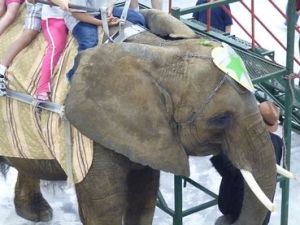 Elephants are often seen as the symbol of the circus. Yet, these living, breathing, symbols often experience horrendous treatment at the hands of their handlers/owners. Elephants are best left in their natural habitat; but when that is not possible, transferring them to sanctuaries is the only humane answer to their continued incarceration. Please help one elephant in particular who needs rescuing from the horrors of life under the “big top.”
Elephants are often seen as the symbol of the circus. Yet, these living, breathing, symbols often experience horrendous treatment at the hands of their handlers/owners. Elephants are best left in their natural habitat; but when that is not possible, transferring them to sanctuaries is the only humane answer to their continued incarceration. Please help one elephant in particular who needs rescuing from the horrors of life under the “big top.”
Nosey has been with the Hugo Liebel family for over a decade during which time numerous violations of the Animal Welfare Act have been noted. Yet, the U.S. Department of Agriculture has not removed her from this circus.
The Universities Federation for Animal Welfare studied the lives of circus animals and found that circus animals spend an average of 1-9 percent of their time training and the rest of their time confined to cages, wagons, or other enclosures entirely inadequate for their size and natural behaviors. The animals most negatively affected by the limitation of space are elephants, lions, tigers, and bears. Circus animals also suffer from stress induced by travel. The presence of the stress hormone cortisol in the saliva of circus animals is at abnormal levels for up to six days after transport.
The study further identified that circus animals are kept in conditions dramatically different from their natural habitat. Elephants can be shackled for 12 to 23 hours a day in areas of only 7-12 square meters. In contrast, elephants in the wild spend 40-75 percent of their time feeding and move up to 50 kilometers a day.
Nosey has suffered enough at the hands of the Liebel family. Please write a polite letter to the Deputy Administrator for Animal Care requesting that Nosy be removed from the Liebel family and sent to a humane elephant sanctuary where she can be free of the torment she has received while forced to perform in Liebel’s circus.
Chester A Gipson, DVM
Deputy Administrator, Animal Care
US Department of Agriculture, APHIS
4700 River Road Unit 97
Riverdale, MD 20737-1234
The state of West Virginia has before it HB 2372, which would prohibit an owner or manager of an elephant from engaging in abusive behavior toward his or her elephants. No animal should be subjected to deprivation of food, water, or rest nor should any animal receive physical punishment of any kind severe enough to injure or maim the animal. Elephants whose owners or managers are found to be engaging in abusive practices must be brought to justice. Passage of HB 2372 would protect elephants in the state of West Virginia.
Residents of West Virginia, please write a polite letter to the chair of the House Agriculture Committee urging him to report out favorably this important animal protection measure. Also, write your state delegate urging his or her support of HB 2372.
The Honorable Greg Butcher
Chair
House Agriculture Committee
Room 216E, Building 1
State Capitol Complex
Charleston, WV 25305
 Paws Up!
Paws Up!












